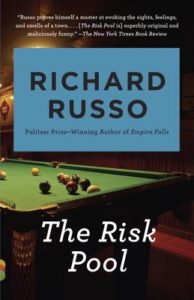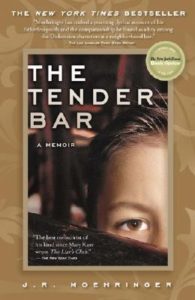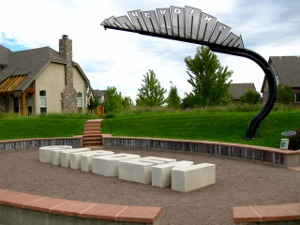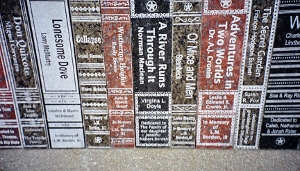Books, like life, are filled with good—sometimes even great—fathers. Ditto for the tyrants. For every noble Atticus Finch-like character, there are some real stinkers, the love-to-hate-them kind of Dad, like Larry Cook, a modern-day King Lear, in “A Thousand Acres.”
While it is easy to cheer for the good guys and boo the baddies, what about the in-betweens, those who are neither patient nor prudent, but who are certainly not evil? Often, it is the flawed characters―the quirky, irresponsible, feckless, fickle, irascible, hyperbolic, conflicted, cowardly, and sometimes even absent―who make the most engagingly readable characters.
These faulty literary chaps make rotten relationship-material where mates are concerned, and they teeter on the verge of flunking fatherhood. Except…except…their flaws that make maddeningly human, and it is what lies beneath their flaws that oftentimes gives them a shot (sometimes a very long-shot) at much-needed redemption.
 Sam Hall is such a father. The opening lines of “The Risk Pool” let us see him for the ne’er-do-well that he is: “My father, unlike so many of the men he served with, knew just what he wanted to do when the war was over. He wanted to drink and whore and play the horses.”
Sam Hall is such a father. The opening lines of “The Risk Pool” let us see him for the ne’er-do-well that he is: “My father, unlike so many of the men he served with, knew just what he wanted to do when the war was over. He wanted to drink and whore and play the horses.”
If you are like me, you will shake your head, mutter, and grit your teeth at Sam. And like me, you might also laugh out loud or shed a tear as the story unfolds.
Many people will recognize the two-time Pulitzer Prize-winning author, Richard Russo, (“Nobody’s Fool” and “Empire Falls”) but “The Risk Pool” was one of his early works, published almost 30 years ago. If you overlooked it, go back and read it! The book is vintage Russo, where relationships are complex in a way that is a lot like life.
On the non-fiction front, “The Tender Bar,” is a memoir by J.R. Moehringer that offers a different kind of fodder-for-thought about fatherhood, such as: sometimes it takes a village (or in this case, a bar) to raise a child.
Don’t worry, the underlying message here is that not that it is a good thing for a kid to grow up hanging out in a bar, although in this memoir, one did.
The book is a lovely reminder that the ability to channel fatherly virtues is not limited to biological connections. If we get lucky, other Pater-figures, often without even knowing it, may help mentor and shape our lives. It is a sweet―not sappy―story, and like the title, it is a tender tale worth reading.
June is the month when we celebrate fathers but also when another sort of “parental care” starts to bear fruit (and vegetables) of labor…literally. My own Dad was a passionate and prolific gardener. He believed that if a row of green beans or corn was good, then an acre was better. He planted, tilled, and hoed the ground into neat, weedless rows then later nurtured the sprouts with the kind of care usually afforded to newborns. Dad loved to share his garden’s bounty ― perhaps a little too enthusiastically. He once delivered a truck bed filled with turnips to a friend-of-the-family who had casually mentioned that she might like to have “a bunch.”

(Photo used with permission)
I love to watch things grow but the horticulture gene completely passed me by. Yet, when a Colorado-based friend shared a story about a local Reading Garden, I glimpsed the sort of gardening experience that I could aspire to. The Lowry Reading Garden, located in the Denver suburbs, is much more than a garden for reading―it is a garden about reading.
This special outdoor space uses granite blocks that are shaped into book spines that form the interior edge of the garden. Donors dedicate the book(s) and the granite spines are then engraved with the book title, author and the names of the donor and the honoree.
How wonderful would it be if more towns had inspired reading spaces like this?
While The Reading Garden is made from inanimate stuff (i.e. rock), it is quite animate in its potential to cultivate minds and spirits. I predict that its real harvest will be a perpetual crop of love…and one of legacies.
More Father’s Day Reading Suggestions
“A Prayer for Owen Meany” (John Irving) • “Big Russ and Me” (Tim Russert) • “Cutting for Stone” (Abraham Verghese) • “Empire Falls” (Richard Russo) • “Gilead” (Marilynne Robinson) • “The Bartender’s Tale” and “The Whistling Season” (Ivan Doig)